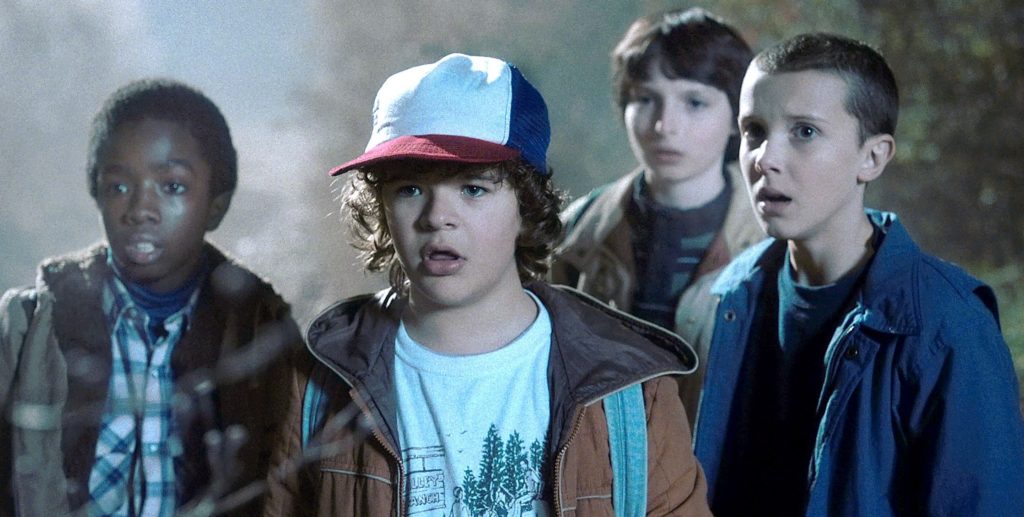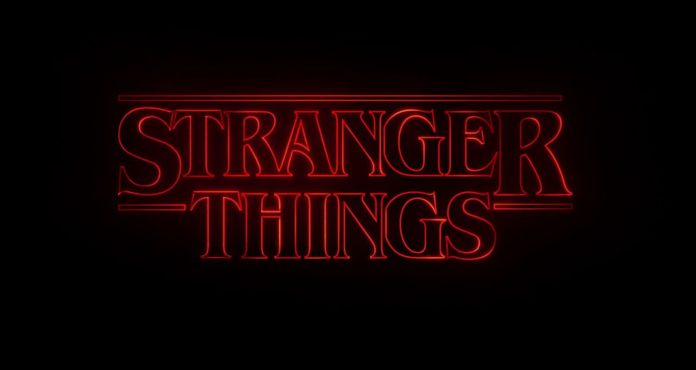Netflix’s “Stranger Things,” released in 2016, is a horror-thriller-mystery that is deeply rooted in the 1980s. From the first five minutes of the brand new series, it is readily apparent that this show is taking viewers on an experience that will force them to consistently challenge their perceptions and expectations.
“Stranger Things” succeeds at leading the audience through an intertwining mystery while also serving as one of the best pieces of ’80s nostalgia.
“Stranger Things” takes place in 1983 in the fictional town of Hawkins, Ind. Will Byers (Noah Schnapp), a young boy, goes missing after returning home from a late night Dungeons and Dragons session with his three friends. Just after Will’s disappearance, another child, who speaks a handful of words and goes by the name Eleven (Millie Bobby Brown), seemingly appears from nowhere.
What follows is a narrative that tries to solve the mystery of Will Byers’ disappearance from multiple perspectives: Will’s friends (with assistance from Eleven), Will’s mother, Joyce (Winona Ryder), and the Hawkins Police Chief, Jim Hopper (David Harbour).
What makes this story work so well is that the series knows exactly what it is. It proudly breathes the 1980s, and it’s because of its dedication to the era that this series ultimately thrives. Early on the series takes on a feel much like Steven Spielberg’s “E.T.,” but it later shifts to a tone more emblematic of John Carpenter, Sam Raimi and Stephen King’s works.
The creators of the show, the Duffer brothers, readily acknowledge these associations within the show itself as the bedrooms of various children display posters of films such as “The Thing” and “Evil Dead.”
“Stranger Things” lives or dies by its ability to present multiple groups working to solve the same mystery. Fortunately for the show, it is beautifully executed. The real heart of the show is represented by the group of Will’s friends. Mike (Finn Wolfhard), Dustin (Gaten Matarazzo) and Lucas (Caleb McLaughlin) have a really good rapport with one another, and one is left with the impression that the friendship between them is beyond believable.
Millie Bobby Brown’s Eleven adds an interesting dynamic to the group by disrupting their flow. Their dedication to solving Will’s disappearance provides the youth an example of kids rising to the challenge by being brave, smart and cunning.

This show is filled to the brim with characters who all get respectable screen time, and thus it is difficult to touch on all of them for this review, but in regards to the story, all of the characters’ storylines converge within the last two episodes, which effectively heightens the tension of the narrative.
Even the sub plot of another character’s disappearance naturally fits into the main through-line of the story. Across the board, the performances are good to great, but three characters provide standout performances.
Winona Ryder’s Joyce is the perspective that most parents would expect to relate to. She’s a mother who is grasping at every hope that her son is alive and refuses to believe the word of others, instead choosing to rely on her parental instincts even in the face of the absurdity of her own logic.
Ryder conveys a sense pain, hope and devastation that I believe most parents would feel if faced with a similar situation of a lost child. Her performance in “Stranger Things” is nothing short of great, and it is honestly fantastic to see Ryder return to prominence with her portrayal of Joyce.
As stated earlier, the show forces the viewers to challenge their expectations and perceptions, and that is embodied with two characters, Chief Hopper and Eleven.
Hopper is a character we see change the most. It seems early on that he may be fairly formulaic but through Harbour’s performance, he eventually shows he’s a deep character who has many levels to his personality, and he eventually became the character that I rooted for the most by the end of the season. The Duffer brothers expertly subverted my expectations, and I was delighted to see Hopper go through a substantial character arc.
Eleven is the best and most dynamic character of the show, and Brown’s performance is equally the best as well. Her character challenges expectations because it is assumed early on by various characters that she is a boy. This is used as an effective, yet minor, narrative device for “Stranger Things.”
Eleven seems wildly intelligent but lacks the social experience to convey it. She is probably one of the most realized female heroes in modern television and film, and because of that she may also be the strongest female hero. She experiences fear, pain and physical weakness but is able to overcome them to become the backbone of the series.
Eleven captures the essence of childhood, when we are constantly observing and learning from the world around us. Thus, her character reflects the best beats of Spielberg’s “E.T.”
The last major positive of this review are the overall cultural references within the show. It has a lot of them. From “Star Wars” to Dungeons and Dragons and The Clash in between, “Stranger Things” feels as if it was written in the era.
Sometimes films can be overwhelming in regards to the inclusion of pop culture references, feeling as if the writers are trying to cash in on the nostalgia just for nostalgia sake. That isn’t a problem with “Stranger Things” because the references are actually fundamental to the plot of the show. From the boys getting “Lando-ed” to the explanation of Will’s disappearance using Dungeons and Dragons parlance (including naming the villain a Demogorgon), this show roots its story in ’80s culture, and it only helps to enrich the narrative.
The one negative I have for the show is that it is being set up for a second season. I would rather the show have been a mini-series and the eight-episode season be extended to 10. I feel this way because I don’t really know what is left to explore or what could be added to season two that will feel fresh and not a rehash of the first season.
Because this show has a plot-based in mystery, by the time the show ends the mystery and the mythos that the world presents have been solved. We, the audience, already know everything we need to know, and that leaves audience intrigue harder to attain in future seasons.
I know our film and television culture is conditioned to want sequels and additional seasons, but this show really explored everything it needed to and further seasons, in my opinion, probably won’t be able to match the standard set by season one. Sometimes it’s better that we don’t get a continuation of a story. In the case of “Stranger Things,” the story they tell is wonderful, but I do not believe it has the legs to endure future seasons.
Netflix’s “Stranger Things” is a hybrid of all of the best 1980’s film icons. Take the best of Steven Spielberg, John Carpenter and Stephen King, with a little bit of Wes Craven alongside a fantastic ’80s horror-techno soundtrack, and you have a great new show and a brilliant love letter to ’80s cinema.
I give “Stranger Things” 8.5 out of 10.
Keep Colton Morman’s in-depth reviews of the latest entertainment offerings coming with a $5-per-month donation to ThePerryNews.com. To get started, simply click the Paypal link below.

















